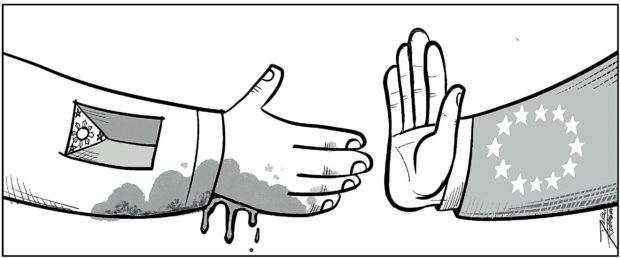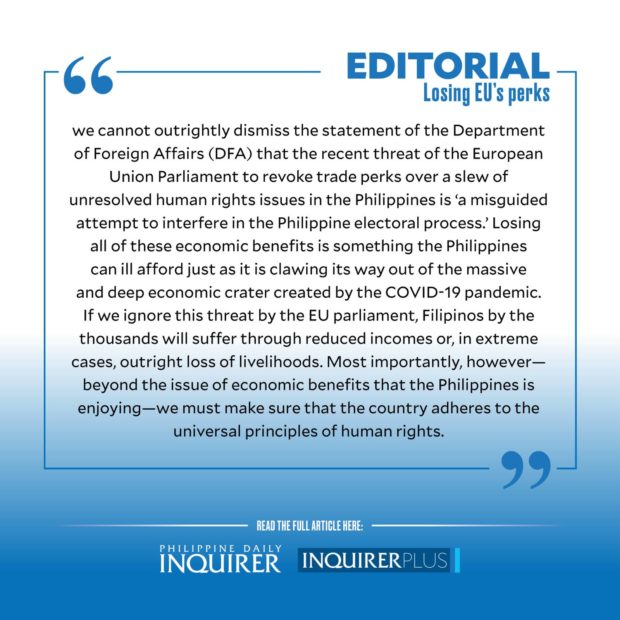Losing EU’s perks

Nothing happens in a vacuum in the geopolitical arena. In international relations, every act is a deliberate one, for the most part, with actions, reactions, and consequences often carefully thought through by parties making the first move. Coincidences are a near impossibility.
So we cannot outrightly dismiss the statement of the Department of Foreign Affairs (DFA) that the recent threat of the European Union Parliament to revoke trade perks over a slew of unresolved human rights issues in the Philippines is “a misguided attempt to interfere in the Philippine electoral process.”
After all, powerful nations have used this modus operandi with great success throughout history when trying to influence political outcomes under the guise of caring for one aspect or another of the target country’s marginalized stakeholders.
It is also possible that, as the DFA alleges, well-meaning European lawmakers are influenced by local groups who want the results of the upcoming elections to go their way, whether they be members of the opposition, left-leaning groups, or journalists.
But the more compelling elements of the issue that cannot be flatly dismissed, as the DFA would want the public to do, is the human rights situation in the Philippines that has severely deteriorated during this administration.
From thousands of extrajudicial killings in the bloody war against drugs, to the Red-tagging of people perceived to be ideologically aligned with the left, to the persecution of political opponents, to name just a few, the administration’s track record on human rights is arguably one of the worst in Philippine history, next only to the tally of violations racked up during the years of the Marcos dictatorship.
“Parliament strongly condemns the thousands of extrajudicial killings and other serious human rights violations related to President Rodrigo Duterte’s ‘war on drugs’ in the Philippines,’’ said the EU Parliament resolution adopted on Feb. 17. It also urged the Philippine government to “step up their efforts to ensure fair and free elections and a non-toxic environment for on- and offline campaigning.” The resolution, approved with a vote of 627 out of 684 members, called on the European Commission, the Union’s executive branch, to “set clear, public, time-bound benchmarks … to comply with its human rights obligations” and to “immediately initiate the procedure” for the temporary withdrawal of the Generalised Scheme of Preferences Plus (GSP+) access until the Philippines showed substantial compliance. The EU Parliament passed a similar resolution in September 2020.
Of course, these privileges come with strings attached. As noted in the EU resolution, the GSP+ perks are dependent on implementation of 27 international conventions on human rights, labor rights, environmental protection, and good governance.
And even granting the remote possibility that liberal democracies like the European Union are leveraging off the dismal human rights situation in the country to exercise control over our affairs, it cannot be denied that the violations deserve closer scrutiny from our very own policymakers.
Dismissing these issues as the result of the machinations of the opposition or the left or disgruntled journalists is a great disservice to the people who stand to be adversely affected by the sanctions threatened by the EU.
Thanks to the GSP+ privileges granted to the Philippines by the 27-nation trading bloc in 2014, thousands of local products currently enjoy tariff-free status upon entering the large European market. That means the products of Filipino farmers, fishermen, and micro, small, and medium enterprises are made more attractive to European buyers because they are cheaper sans tariffs.
The European Union is the country’s fourth largest trading partner and the value of the two-way trade between Europe and the Philippines exceeds 12 billion euros annually. The country’s top exports to the European Union are electronic products, coconut oil, manufactured goods, tuna, and machinery and transport equipment.
Most importantly, Europe as a whole is the single largest source of foreign investments for the Philippines.
Losing all of these economic benefits is something the Philippines can ill afford just as it is clawing its way out of the massive and deep economic crater created by the COVID-19 pandemic.
If we ignore this threat by the EU parliament, Filipinos by the thousands will suffer through reduced incomes or, in extreme cases, outright loss of livelihoods.
Most importantly, however—beyond the issue of economic benefits that the Philippines is enjoying—we must make sure that the country adheres to the universal principles of human rights.
One could say that foreign powers and local oppositionists are being opportunists in raising these issues just as the 2022 elections approach. But it cannot be ignored that the concerns being raised are valid and deserve the government’s fullest attention. It’s not even about economics. It is simply the right thing to do.
RELATED STORY
EU lawmakers warn PH of losing trade perks due to rights record





















